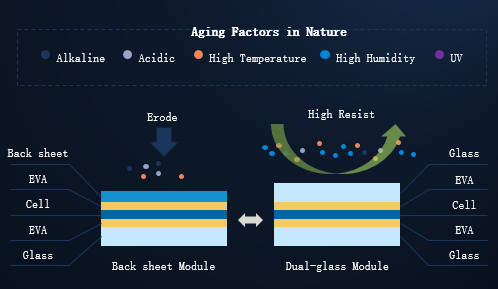Advantageous and reliable ultra-high power bifacial dual-glass modules are playing a significant role in boosting energy yields and thus creating greater value for end customers. A virtual conference titled Bifacial & Solar Trackers – Boosting Solar Power Plant Yields was recently organized by Taiyang News, a disseminator of news related to the solar power industry. As part of the conference, industry experts studied empirical data from field tests, showing higher energy produced by bifacial Vertex ultra-high power modules in different environments. 20 GW+ of Trina Solar’s bifacial dual-glass modules have now been shipped.
Optimizing project design for best bifacial modules energy gain
Compared with mono-facial modules, ultra-high power bifacial modules generate higher power output, in that the total power generation comes from both front and rear sides of the module, while the latter depends on the bifaciality and the irradiation that reaches the rear side of the panel.
Backside irradiation is affected by various factors, including environment, project design, and ground surface condition. In Trina Solar’s empirical study, analyses were done of three main factors: Albedo latitude, scattered light and the mounting height’s (elevation) contribution to energy yield of bifacial modules. Higher albedo, higher latitude, more scattered lights and higher elevation would normally contribute to greater yield gain.
Bifacial 210 Vertex module boosts energy yield efficiently in various environments
The cases presented at the conference included three different types of ground: Grass, gravel flat floor and sand. They were conducted by third-party institutes and demonstrated higher energy yield of Trina Solar’s bifacial Vertex 600W+ modules.
Bifacial 670W+ modules in Hainan, China, tested by TÜV Rheinland, were installed on grass at a latitude close to tropical. The field data showed that the power generation of the 210 bifacial module was about 6.1% higher than that of a reference 210 mono-facial module per watt.
In Cologne, Germany, the same modules tested by TÜV Rheinland were located on gravel. Due to higher latitude and higher scattered light and advantages in low irradiation, the power generation of the 210 bifacial Vertex module was more than 8.6% higher than that of the reference 210 mono-facial module per watt.
In Yinchuan, China, bifacial Vertex modules tested by CPVT were installed on sand at a medium latitude. The power generation of the 210 bifacial module was more than 10.51% higher than that of the reference 210 mono-facial module per watt.
In addition to all these tests, Trina Solar has conducted other empirical studies, including on grass, sand, white substrate, cement, with results that show the bifacial module has realized considerable gains and significantly reduced energy costs.
210 bifacial module’s excellent reliability
Trina Solar’s 210 bifacial module demonstrates superior reliability in various ways.
First, in the structure the bifacial module requires replacing the standard solid backsheets with glass. Double glass encapsulation provides additional protection to embed solar cells because of its excellent reliability and durability through high resistance to five aging factors in nature: Alkaline, acidic, high temperature, high humidity and UV.
Moreover, superior reliability, including longer product warranty (upgraded to 30 years), lower degradation (P-PERC 2% first year, 0.45% annually) and excellent bifaciality (P-PERC: 70% ±5%, N-type: 80% ±5%) also contribute to greater energy yield.


The performance and reliability of Trina Solar’s 210 bifacial modules has also been endorsed by independent testing organizations such as RETC and PVEL. Last month, the company was recognized as an Overall High Achiever by RETC for its 670W series modules’ superior reliability, performance and quality. Earlier, Trina Solar was named a Top Performer by PVEL for the eighth year in a row, highlighting Trina Solar’s commitment to excellent quality consistency, high reliability and outstanding safety of its modules.
Superb bifacial modules’ value: lower LCOE
As a result of significantly higher energy gain and reliability, Trina Solar’s Vertex 210 bifacial modules contribute to lower LCOE. At the recent conference, Trina Solar presented the results of a virtual 50MW project assessment in Spain (latitude: 37.25º N, longitude: -5.87º W, altitude: 60 m, GHI: 1850.3Kwh/m2, DiffHor:597Kwh/m2) showing that in a fixed tilt system bifacial modules can reduce LCOE by 1.93%, and in a tracker system 2.26%.
Higher energy yield and lower LCOE prove bifacial modules’ great value. Trina Solar has always been committed to creating greater value for its global customers through its unstinting efforts in technological and product innovation.
Want the latest updates on market developments in the Asia Pacific region, Trina Solar’s news, and our latest innovations and technologies? Join our newsletter here!
Relevant Topics
Smart Energy Solutions
delivered straight to your inbox

More Events

